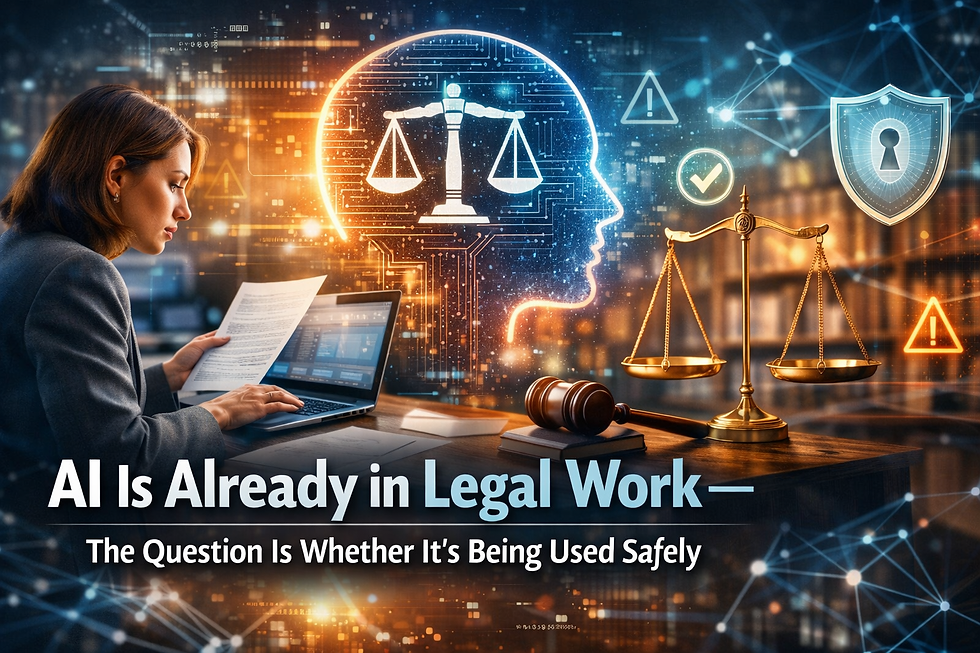Why AI Fluency is Essential for the Future of Legal Support Professionals
- Lakisha Bealer, MBA
- Jul 29, 2025
- 5 min read
In today's digital age, artificial intelligence (AI) is transforming the legal profession in ways that can hardly be ignored. Just like how proficiency in Word or Excel became non-negotiable for office workers, AI fluency is quickly becoming an essential skill for legal support professionals. The question is, how prepared are you for this shift? In this article, we will explore how AI is reshaping the legal field, what AI fluency looks like for paralegals, and the concrete risks of falling behind in tech adoption. We will also extend an invitation to enhance your skills through the Legal AI Bootcamp.
How AI is Already Changing the Legal Profession
AI is revolutionizing the legal industry with a range of applications that significantly improve efficiency and accuracy. For example, AI-driven platforms can analyze huge volumes of legal documents in just seconds. A leading service provider, such as Kira Systems, claims that their platform can reduce document review time. This means legal professionals can identify relevant information much quicker than traditional methods, which could take hours or even days.
Legal research is also becoming faster and more precise. AI tools now allow attorneys to search massive databases for precedents and case laws within minutes, rather than pouring over lengthy documents manually. This enables lawyers to devote more time to strategic planning and client interactions instead of getting lost in paperwork. As these tools continue to evolve, their role will likely expand, making it imperative for legal professionals to learn and embrace AI technologies.
What AI Fluency Looks Like for Paralegals
Becoming AI fluent does not require paralegals to learn coding or develop AI systems. Instead, it focuses on practical skills that can be applied in the legal environment. Here are essential components of AI fluency that every paralegal should aim to master:
Familiarity with AI Tools
It's vital for paralegals to know which AI tools are available and how to use them effectively in daily tasks. This also includes understanding what these tools can do and where they might fall short. For example, knowing how to use e-discovery platforms like Relativity can drastically enhance a paralegal's ability to manage large sets of documents.
Data Literacy
AI systems rely heavily on data input to function well. Paralegals should be comfortable interpreting data and understanding how AI reaches its conclusions. For instance, recognizing potential biases in algorithmic results can help ensure that the tools are used appropriately.
Collaboration with Tech Teams
Building strong relationships with IT professionals can smooth the path for paralegals in leveraging AI tools. This will enable paralegals to advocate for better systems and identify opportunities to enhance workflows through technology.
Continuous Learning
The tech landscape is always changing, and adopting a mindset focused on learning will help legal professionals keep pace. Attending training programs, legal tech seminars, and participating in platforms like the Legal AI Bootcamp can greatly enhance skills.
These competencies will not only boost individual careers but also reshape how legal teams function altogether.
Real Examples of Legal Teams Hiring for Tech-Savvy Support Roles
Firms are increasingly aware of the blending of legal expertise with technological skills. Here's how this trend is manifesting in hiring practices:
Top Law Firms: Many leading firms now specifically seek paralegals experienced with AI applications for e-discovery and document automation. Any familiarity with these technologies can give candidates a significant edge. According to a survey, approximately 75% of law firms prioritize technology skills when hiring.
In-House Legal Departments: Many companies are seeking tech-savvy legal assistants to help modernize internal processes. These roles are increasingly important for managing AI tools that assist in contract reviews and compliance checks.
Consulting Companies: Organizations focused on legal consulting often look for professionals who can leverage AI for client solutions. Candidates skilled in communicating AI benefits to clients stand out in competitive hiring environments.
These examples underscore the vital changes in hiring that are evolving alongside advancements in technology.
The Risks of Falling Behind in Tech Adoption
Neglecting to embrace AI fluency presents considerable risks for legal support professionals. As technology continues to shift, the divide between those who adopt these advancements and those who resist will only grow.
Legal professionals lacking AI skills might find themselves sidelined during job discussions. Here are some key risks to consider:
Job Displacement: As AI applications take over routine tasks, roles traditionally viewed as essential could diminish. The World Economic Forum estimates that around numerous jobs could be displaced due to AI.
Diminished Competitiveness: Firms constantly seek ways to improve their services. Legal support professionals without up-to-date knowledge of tech tools may find themselves less competitive than their peers who embrace AI.
Limited Opportunities for Advancement: A lack of AI proficiency may hinder career progression. Those with tech skills are more likely to be considered for higher-level roles, as businesses increasingly rely on technology for essential operations.
In the fast-moving legal environment, not embracing technology can jeopardize career stability.
Invitation to the Legal AI Bootcamp as a Career Investment
For those ready to take charge of their future in legal support, the Legal AI Bootcamp provides a structured way to build essential AI skills. This program is tailored for legal professionals eager to gain practical experience without needing formal coding expertise.
What to Expect from the Bootcamp
Hands-on Training: Participants will engage with cutting-edge AI tools that are crucial in today’s legal landscape. This is about gaining real-world experience, not just theoretical knowledge.
Networking Opportunities: You will connect with fellow legal support professionals, setting the stage for future collaborations.
Expert Guidance: Expert led sessions, helping participants navigate the complexities of AI in legal contexts, ensuring that each attendee leaves with the knowledge needed to thrive.
Career Advancement: Completing the Bootcamp will not only boost your skills but also serve as a competitive asset in your job search or career growth, opening doors to new opportunities.
Investing in the Legal AI Bootcamp is a strategic choice for those looking to secure a bright future in an ever-evolving industry.
Embracing the Future of Legal Support
AI fluency has become an essential skill for legal support professionals, much like the digital literacy wave that swept through the industry fifteen years ago. As AI tools become more entrenched in the legal field, learning to utilize these advancements is both a professional necessity and a competitive advantage.
By investing in your AI skillset through initiatives like the Legal AI Bootcamp, you will not only bolster your capabilities but also ensure your continuing relevance in a rapidly changing landscape. Don’t let the future pass you by—take proactive steps to be a part of it.




Comments